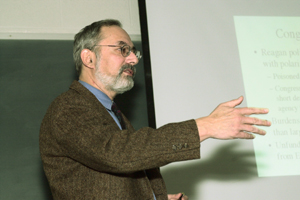 |
|
||
|
Vol. IV No. 14 · 17 November 2000 |
|||
B.U. Bridge is published by the Boston University Office of University Relations.
A plague in both your parties
SPH prof’s jeremiad scorches U.S. environmental policy
By David J. Craig
Al Gore and George W. Bush were relatively quiet on environment issues during this year’s presidential campaign, and it may have been just as well.
|
|
|
| David Ozonoff, an SPH professor and chair of the school’s department of environmental health, delivered a lecture about the history of environmentalism at the BU Medical Center on November 7. Photo by Kalman Zabarsky | |
Progressive environmental policies that affect public health in this country have been spawned not from government initiatives, but from the tenacity of grassroots activists, according to David Ozonoff, a School of Public Health professor and chairman of the school’s department of environmental health. He delivered a lecture about the history of environmentalism at the BU Medical Center on November 7.
"Al Gore is better on the environment than Bush, but he’s still absolutely horrendous on the environment," said Ozonoff, whose lecture was riddled with political satire and a less-than-subtle endorsement of Ralph Nader.
As evidence of what Ozonoff believes is the disingenuous
nature of Gore’s concern for environmental issues, he cited allegations that Gore lobbied in favor of a large East Liverpool, Ohio, incinerator, between the time Clinton was elected in 1992 and the new administration took office. Erected in 1992, the WTI incinerator is the world’s largest hazardous waste incinerator, and rests just 200 feet from residences and 1,100 feet from an elementary school.
"Trucks carrying hazardous materials rumble past the school all day long, and if there was ever an accident, there wouldn’t be time to evacuate the children," said Ozonoff. "That thing never should have been permitted, and everybody knows it."
Yet, in the fall of 1992, Ozonoff noted, soon after Gore promised Ohio citizens that the incinerator would not be used while Clinton was president, one of Gore’s advisors instructed William K. Reilly, the head of the federal Environmental Protection Agency (EPA), that Clinton and Gore wanted permits issued for the incinerator to become operational before they took office, according to testimony Reilly has given at the request of the EPA. News of the testimony was reported on November 3, and the Gore camp has denied the allegations.
"It’s an outrageous case, and similar issues go unaddressed all the time," said Ozonoff, who, in an interview later, criticized the Clinton administration for its half-hearted attempts to regulate toxics, such as the solvents found in dry cleaning chemicals and the dioxins produced when plastics are incinerated, which are commonly found in food.
It should be no surprise that the federal government has failed to lead efforts to improve environmental health. Since Ronald Reagan slashed the EPA’s budget in the early 1980s, federal and state environmental agencies, hobbled by a lack of resources, have been unable to properly regulate U.S. industries, according to Ozonoff.
Although Congress has passed tough new environmental laws for industry in the past decade, he said, federal and state regulatory agencies still do not have the resources to enforce them. Funding for the EPA has increased under Clinton, but is far below the levels of the late 1970s.
"The EPA continues to get very little cooperation from the White House," he said. "And that’s not going to change if Gore wins the election. He’s been under attack for being in favor of big government, and he’s responded by saying he’ll create not one new position in the federal government."
According to Ozonoff, the efforts of grassroots activists who gather to fight a specific issue have led to almost all the major advances in environmental health policy in the past quarter of a century -- including the ban on lead in gasoline, the pesticide DDT, and the most obvious forms of industrial pollution, such as dumping waste directly into rivers and burning it in open dumps, as well as a reduction of most air pollutants by 30 to 50 percent.
"The single exception I can think of," he said, "is awareness about global warming, which came from scientists."
Ozonoff hopes that within the next 10 years public support for tougher restrictions on the production and disposal of the toxic materials found in plastics will be similarly successful.
"We believe that these toxics harm the endocrine system,"
he said. "And they’re so ubiquitous that there is no test for them. Some of them are used to soften plastics, and they are in absolutely everything, including our food and water."
If the public doesn’t press the cause, Ozonoff said, nobody will. "Many people think that when a government agency comes to investigate a report of contamination in their town, they want to find something," he says. "The truth is that they don’t, because if they do find something wrong, then the mayor’s office wants them to correct it, and often they don’t know what to do. Meanwhile, the local real estate and business leaders start going crazy, and the polluter hires experts to say that the government agents are fools. If the citizens get tired and go away and forget about it, no one ever figures out whether or not there was really something wrong."
![]()
17
November 2000
Boston University
Office of University Relations
